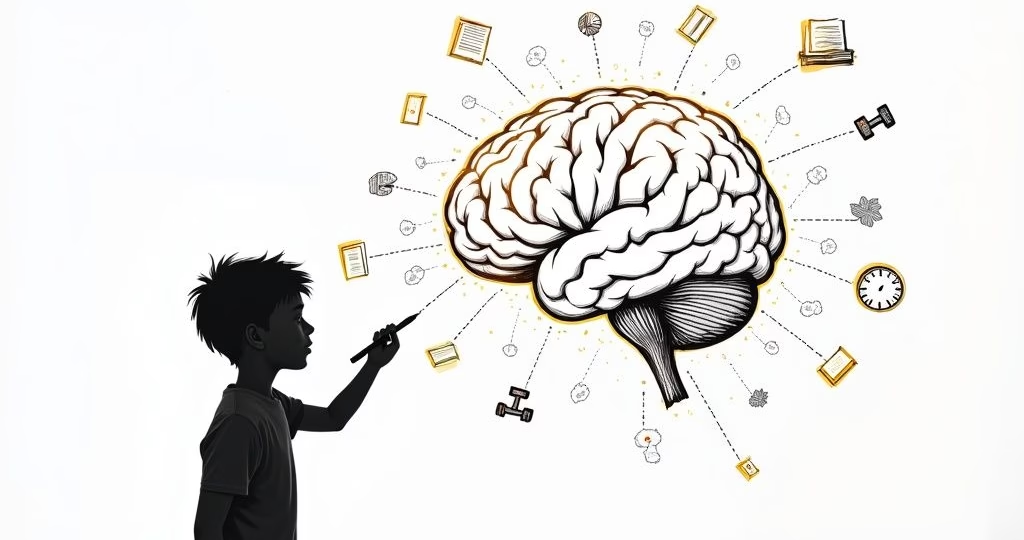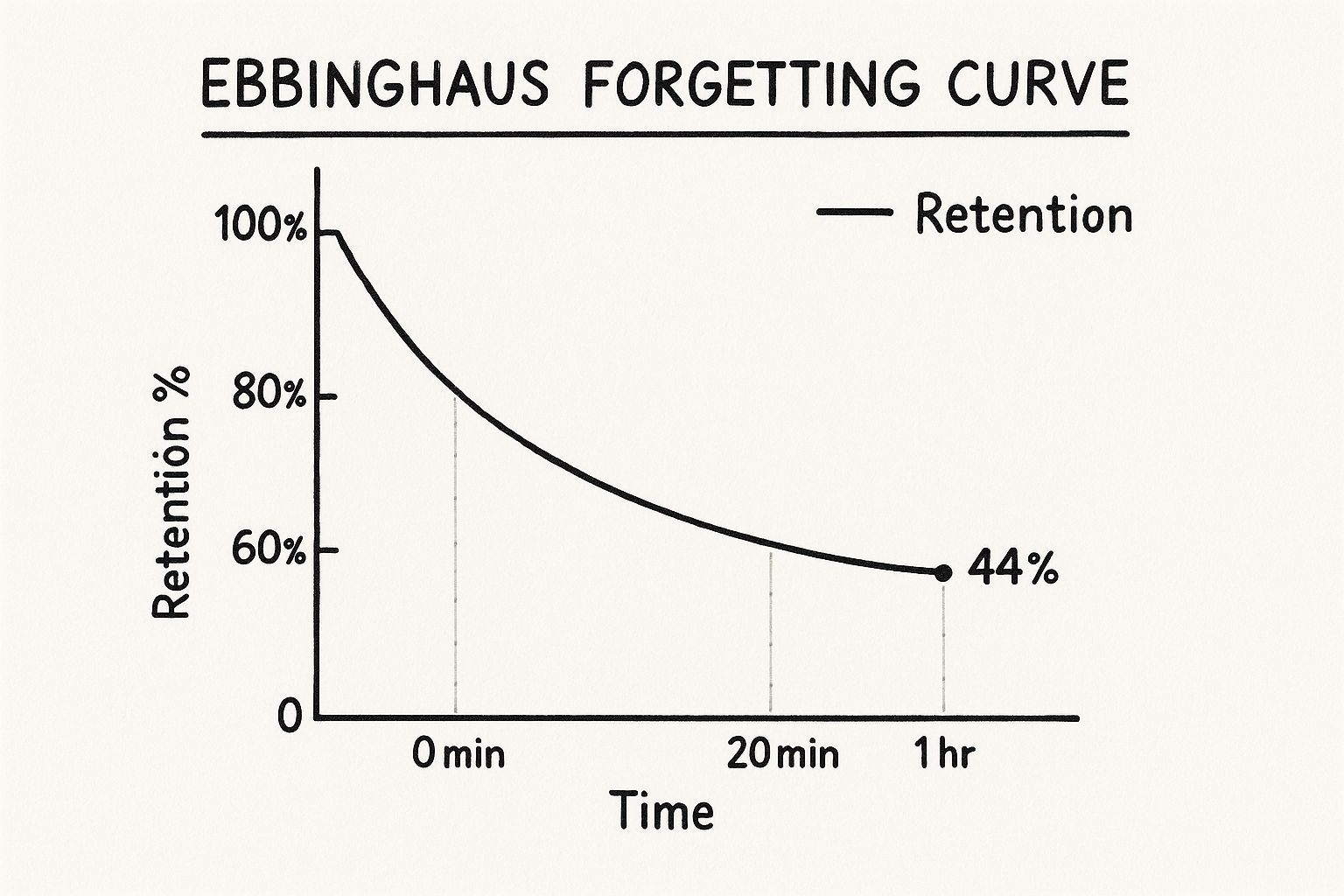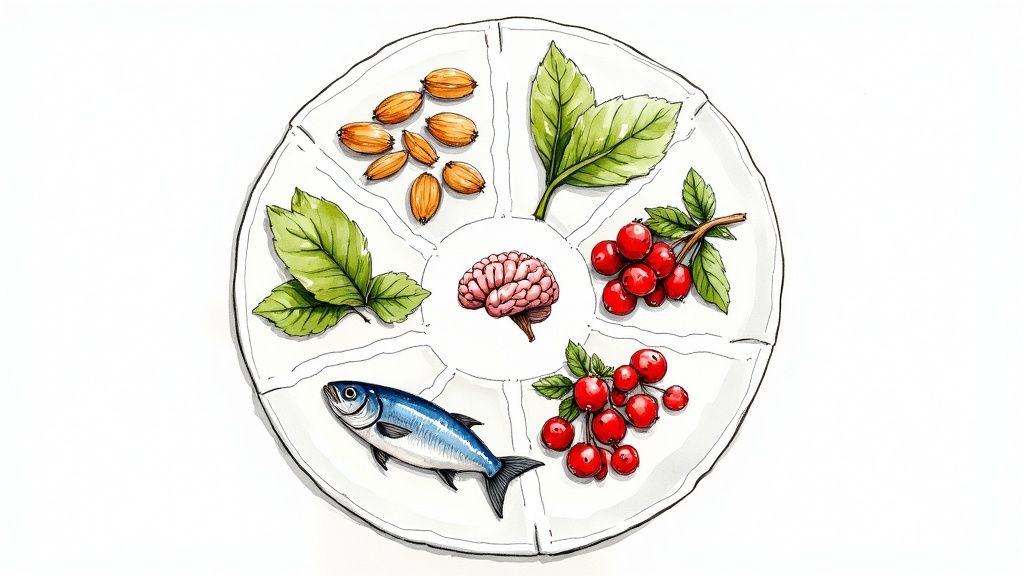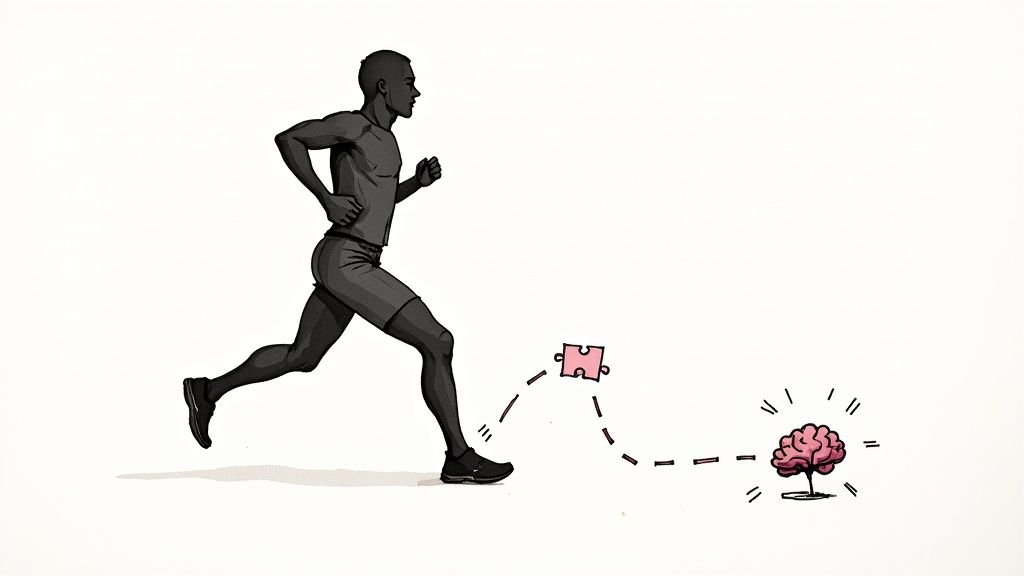
Ever feel like the stuff you learn in class goes in one ear and right out the other? You’re not alone. Forgetting isn’t a sign that you have a "bad" memory; it’s actually your brain’s default setting for new information it hasn't been told is important.
Think of it this way: your brain is a master at filtering. It has to be, or you’d be overwhelmed. When you learn a new formula in math or a key date in history, your brain holds onto it for a little while. But if you don’t do anything to signal, "Hey, this is important!" your brain naturally lets it fade to make room for the next thing.
And this process happens fast.
The Forgetting Curve in Action
Back in the day, a psychologist named Hermann Ebbinghaus figured this out and created what’s now called the "forgetting curve." It’s a simple but powerful visual that shows just how quickly we lose new information if we don’t actively try to keep it.
Modern research building on his work paints a stark picture: you can forget around 50% of new information within just one hour and up to 90% within a single week. The good news? Studies on learning retention statistics show that active, hands-on learning can flip that script, boosting retention rates as high as 90%.
Take a look at this. It shows just how steep the drop-off is right after you learn something new.

That immediate, sharp decline is exactly why last-minute cram sessions before a big test feel so useless a week later. You might pass the exam, but the information never really sticks.
The key takeaway is simple: Forgetting is a passive process, while remembering is an active one. You have to intentionally engage with the material to tell your brain, "Hey, this is important—keep it!"
A quick look at the 'Forgetting Curve' and the strategies proven to counteract it, helping you remember more of what you study.
| Time After Learning | Typical Percent Forgotten | Effective Counter-Strategy |
|---|---|---|
| 20 Minutes | 42% | Quick 5-minute review of notes |
| 1 Hour | 56% | Re-read key concepts, try a practice problem |
| 1 Day | 66% | Self-quiz with flashcards, explain it to a friend |
| 1 Week | 75% | Deeper review session, connect to other topics |
| 1 Month | 79% | Full review, apply knowledge in a new context |
This table isn't meant to scare you—it's meant to empower you. By understanding this predictable pattern, you can stop feeling frustrated and start taking control.
The rest of this guide is all about those active strategies. We’re going to get into the specific, practical techniques you can use to fight the forgetting curve and make sure what you learn actually sticks around for the long haul.
Mastering Active Recall Study Methods
Let’s be honest, highlighting and rereading your notes feels productive. But it's a trap. This kind of passive learning creates a false sense of confidence, but the information almost never sticks long-term. If you want to actually improve your memory, you have to switch to active recall.
This means forcing your brain to retrieve information, not just review it.

Think of it this way: rereading your notes is like glancing at a map of a city. Active recall is like trying to find your way around that city without the map. It’s harder, no doubt, but it’s the only way you’ll actually learn the streets.
This mental effort is what separates real understanding from last-minute cramming. For parents, a great way to encourage this is to stop asking, "Did you review your notes?" and start asking, "Can you explain that concept to me?"
Turn Studying into Teaching
One of the most powerful ways to practice active recall is the Feynman Technique. The idea is simple: you don't truly understand something until you can explain it in simple terms.
Here’s how to put it into practice:
- Pick a single concept: Start with something specific, like photosynthesis or the plot of The Great Gatsby.
- Explain it out loud: Pretend you're teaching it to a younger sibling or a friend who has no clue what you're talking about. Use simple language—no jargon.
- Pinpoint the gaps: The moment you get stuck, hesitate, or say "um," you've found a weak spot. That's your cue to go back to your notes and fill that specific gap.
- Simplify and repeat: Go back to your explanation and try again. Keep refining it until it’s so clear and simple that anyone could get it.
This method instantly shows you what you don't know, making your study time way more efficient.
Embrace Consistent Self-Quizzing
Self-quizzing is the engine that drives long-term memory. It's not about cramming—it's about consistent, low-stakes practice that builds strong neural pathways.
Flashcards are the classic tool for this, whether you use physical cards or digital apps like Anki or Quizlet. The magic happens when you force your brain to pull the answer out of thin air before you flip the card. That struggle is where the learning happens.
For many teen boys who are struggling, procrastination isn't about laziness; it’s often tied to feeling overwhelmed or a lack of motivation. Active recall methods break down huge subjects into manageable questions, making it easier to start and build momentum.
Regular quizzing does more than just help you memorize facts; it builds confidence and seriously reduces test anxiety. When exam day comes, the questions feel familiar, not terrifying.
These techniques are a cornerstone of effective study skills for high school students because they build both knowledge and resilience. To take this even further, you can explore different memory aids and advanced study techniques that make learning more dynamic and effective.
Lifestyle Habits That Supercharge Your Brain
Active recall and smart study methods are game-changers, but they're only half the story. To truly lock in what you're learning, you have to build a strong foundation. The reality is, your brain's performance is directly tied to your daily habits—how you sleep, what you eat, and how you move your body.
Think of your brain like a high-performance engine. You can't expect it to run smoothly on junk food and no maintenance. The good news is that small, consistent lifestyle tweaks can have a massive impact on your ability to focus, learn, and actually remember what you study.

Prioritize Sleep for Memory Consolidation
Let's get one thing straight: sleep isn't just downtime. It's an active, critical process for learning. When you sleep, your brain gets to work consolidating memories, essentially moving the important stuff from your short-term "inbox" to long-term storage. Pulling an all-nighter to cram for a test is one of the worst things you can do for your memory.
Recent research highlights just how powerful this process is. One study showed that re-exposing young adults to information they learned while they were asleep boosted their memory retention by 11%. This isn't passive rest; your brain is actively filing away information while you're out.
For teens, especially those juggling stress or anxiety, sleep is often the first thing to go. Making a consistent sleep routine a non-negotiable is one of the most important steps you can take for both your mental health and your grades.
For parents, understanding the connection between sleep and mental health for teens is crucial. It’s about more than just getting them to bed on time; it’s about helping them build habits that support their well-being.
Fuel Your Brain and Move Your Body
Just like the rest of your body, your brain needs the right fuel to function. You don't need a perfect diet, but a few smart choices can make a huge difference in your mental clarity.
- Eat Brain-Boosting Foods: Try to work in foods rich in omega-3 fatty acids, like walnuts and salmon. Blueberries and even dark chocolate are packed with antioxidants that support brain health.
- Stay Hydrated: This one is simple but so easy to forget. Even mild dehydration can mess with your concentration and memory. Keep a water bottle with you and sip on it throughout the day.
- Get Moving: You don't have to be a star athlete. Seriously. Even a 20-minute walk can increase blood flow to the brain, sharpening your focus and cognitive function.
Beyond diet, certain nutrients can give you an extra edge. If you're curious about what else can help, it's worth looking into the best supplements for cognitive function.
Finding Your Support System
Building these healthy habits is way easier when you have support. For teen guys who are struggling, connecting with others who get it can be a game-changer. Men's groups and other organizations provide safe spaces to talk about pressure, motivation, and mental health without judgment.
Resources like The Jed Foundation offer tools designed specifically for teen mental wellness. Acknowledging that you need support isn't a sign of weakness—it's a sign of strength. These resources are a great starting point for building the resilience you need to thrive, not just in school, but in life. It's not just about grades; it's about setting yourself up for long-term success.
Overcoming Procrastination and Finding Motivation
Procrastination isn't just laziness—it's a massive roadblock to learning and a huge source of stress. So many of us put things off not because we don't care, but because a task feels too big, too boring, or we're scared we won't do it perfectly. This kicks off a nasty cycle of avoidance and anxiety that directly torpedoes your ability to remember what you’re studying.
The key to breaking this cycle is making that first step feel smaller and less intimidating. You don't need some huge burst of inspiration to get going. What you need is a practical system to build momentum.
The Power of Small, Focused Efforts
One of the most effective ways I've found to beat that initial resistance is the Pomodoro Technique. It's incredibly simple: you work in a focused 25-minute sprint, then take a 5-minute break. That's it. This short, manageable chunk of effort makes starting that huge history essay or daunting math assignment feel possible.
This isn't just about managing time; it's a mental trick. Committing to just 25 minutes feels achievable, which helps you bypass your brain's natural urge to run from a massive, overwhelming task. After just one "pomodoro," you've already started—and that’s usually the hardest part. If you feel stuck in this loop, it's worth digging into some real strategies on how to stop procrastinating to get back in control.
For many teen guys who are struggling, procrastination can be tied to deeper things like anxiety or a lack of self-belief. Building structure with small, achievable goals builds confidence and proves that progress is possible, one step at a time.
Connecting Schoolwork to Your World
Let's be real: lasting motivation rarely comes from the threat of a bad grade. It comes from finding a personal hook—a real connection to what you're learning. Try to link those boring subjects to your actual interests.
If you love video games, get curious about the physics engines that make them work. If you're into music, check out the mathematical patterns behind your favorite songs.
This isn’t just a feel-good exercise; it builds stronger cognitive engagement. An international study found a consistent link between higher education levels and better baseline memory performance. This suggests that staying engaged in learning actually builds up a stronger "cognitive reserve." You can see the findings on memory performance and cognitive engagement for yourself. It reinforces the idea that finding a reason to care is one of the most powerful tools for your memory.
If you're still drawing a blank on motivation, remember that your mental wellness is the foundation for everything. Stress and anxiety are absolute motivation killers. Sometimes, the most productive thing you can do is just take a break. A simple meditation can calm your mind and help you refocus.
- Guided Meditation for Teens: Find a quiet spot and sit comfortably. Close your eyes and take a few deep breaths. Just focus on the feeling of your breath moving in and out. When your mind inevitably wanders to your to-do list, gently guide it back to your breathing. Do this for just three to five minutes. It's a quick way to hit the reset button.
Support systems are also a game-changer. For young men, connecting with others can make a huge difference. Men's groups and other support networks provide a space to talk about academic pressure and find healthier ways to cope. Building those connections is a key part of long-term success.
Mental Wellness and Support for Young Men
Let's be real: your mental state is the foundation for everything, especially your ability to remember what you learn. When you're constantly fighting off stress, anxiety, or just a total lack of motivation, your brain simply can't focus on locking in new information. This is a huge deal for young men, who often feel this unspoken pressure to have it all figured out without ever showing a crack in the armor.
Taking care of your mental health isn’t some fluffy distraction from your real goals—it’s the most direct path to crushing them. Tackling things like procrastination, school stress, and that crushing feeling of being overwhelmed isn't a weakness; it's a sign of real strength. It’s about clearing the mental runway so your brain can actually take off.

A Simple Meditation Guide for Teens
Meditation is one of the most powerful, science-backed tools for cutting through the noise and sharpening your focus. The goal isn't to empty your mind—that's impossible. It’s about learning to watch your thoughts come and go without getting swept away by them. Just a few minutes of this can seriously reduce the mental clutter that gets in the way of learning.
Five-Minute Mindful Breathing Exercise
Ready to give it a shot? It's easier than you think.
- Find a comfortable spot. Sit on a chair or the floor—anywhere you won’t be bugged for five minutes.
- Close your eyes. Or, if that feels weird, just lower your gaze toward the floor.
- Focus on your breath. Don’t try to change how you’re breathing. Just notice it. Feel the air coming in, filling your lungs. Feel your chest or stomach rise and fall. That’s it.
- Acknowledge wandering thoughts. Your mind is going to wander. It’s what minds do. When you catch yourself thinking about homework, that text you forgot to send, or what’s for dinner, just notice it without judgment. Then, gently bring your focus back to your breath.
- Repeat for five minutes. Set a quiet timer. When it goes off, slowly open your eyes and just sit for a second. Notice how you feel.
Think of this little exercise as a mental reset button. It can help you walk into your next study session feeling calmer and way more focused.
Building Your Support Network
Trying to navigate the pressures of school and life all on your own is playing on hard mode. It’s so much easier when you’re not going it alone. For teen guys who are struggling, connecting with people who actually get what you’re going through can change everything.
Reaching out for support is one of the smartest and strongest things you can do. It's not about admitting defeat; it's about equipping yourself with the tools and community you need to succeed.
For parents, this is a big one. Encouraging your son to tap into these resources is a game-changer. It sends a clear message that you care about his well-being, not just his report card. Help him see that managing mental health is a skill, just like learning math or a new language.
Here are a few solid organizations that offer support specifically for teens and young men.
Mental Health and Support Resources
Finding the right support can feel overwhelming, so I've put together a quick guide to a few organizations that are doing great work in this space. They offer everything from information and confidential help to community-building, giving you a place to start.
| Resource Name | What It Offers | Best For |
|---|---|---|
| The Jed Foundation | Provides mental health resources, education, and confidential support for teens and young adults. | Teens seeking reliable information and immediate support for mental health challenges. |
| Active Minds | A student-led organization that works to change the conversation about mental health on school campuses. | Students looking to get involved in advocacy and find a supportive peer community at school. |
| The Man Cave | An Australian-based organization offering programs and resources for young men to build healthy masculinity and emotional intelligence. | Young men seeking a safe space to connect with peers and mentors and discuss real-life issues. |
These groups provide incredible tools for anyone looking to build resilience and get their mental health on solid ground. And a solid foundation is exactly what you need for better memory and success in school and beyond.
Common Questions About Memory
Even with the best game plan, questions pop up. Let's tackle some of the most common ones I hear from students and parents about improving memory, with some straight answers to help you through the rough patches of learning.
How Can I Help My Teen Who Keeps Procrastinating?
Watching your teen put things off again and again is maddening. I get it. But the key is to stop nagging about the deadline and start getting curious about why it's happening. More often than not, procrastination isn't laziness. It’s a defense mechanism against feeling anxious, overwhelmed, or terrified of failing.
Start by shrinking the task. Instead of "Get that history project done," try, "Hey, let's just find three solid sources online today." That feels doable. Celebrate those small wins—it builds momentum and, more importantly, confidence.
If you suspect anxiety is the real driver, make sure they know where to find support. The Jed Foundation has some great, no-nonsense guides for parents on how to start those conversations about mental health and find professional help when it’s needed.
What Resources Are Out There for Teen Guys?
Teenage guys face a unique set of pressures and often clam up when they're struggling. It's so important to create an environment where it's okay to not be okay. For young men feeling swamped by school or just plain isolated, finding a space with peers and mentors can be a game-changer.
Here are a few organizations that get it:
- Men's Groups: Finding a local or even an online group can create a real sense of community and a safe place to talk about stress and goals.
- The Man Cave: This organization runs programs specifically designed to build emotional intelligence and a healthier understanding of masculinity.
- Active Minds: This group is all about changing the conversation around mental health on school campuses, giving students a way to get involved and support each other.
Getting them plugged into groups like these can build a kind of resilience that helps with way more than just schoolwork.
Supporting a teen's mental health is a direct investment in their ability to learn. A calm, focused mind can absorb, process, and recall information far more effectively than one bogged down by stress.
Is There a Quick Way to Meditate Before a Study Session?
Absolutely, and it doesn't need to be some complicated, hour-long ordeal. A simple three-minute mindfulness exercise can be enough to hit the reset button on your brain, sharpen your focus, and get you ready to actually learn something.
Here's a quick guide for teens that actually works:
- Find a quiet spot where you won't be interrupted. Sit somewhere comfortable.
- Close your eyes and take three deep, slow breaths. Seriously, make them count.
- Just focus on your breathing. Feel the air coming in, filling your lungs. That's it.
- Your mind will wander. It always does. When it happens, don't get frustrated—just gently bring your attention back to your breath.
Do this for just a couple of minutes before you even crack open a book. This short pause cuts through the mental noise and helps you retain information so much better. It's a powerful little tool for managing the stress that comes with school.
If your teen is trying these strategies but still feels stuck, personalized support can make all the difference. At Andrew Petrillo Life Coaching, I provide one-on-one coaching to give young adults the tools they need to beat procrastination and build motivation that lasts. Book a complimentary discovery call today.
RELATED POSTS
View all



